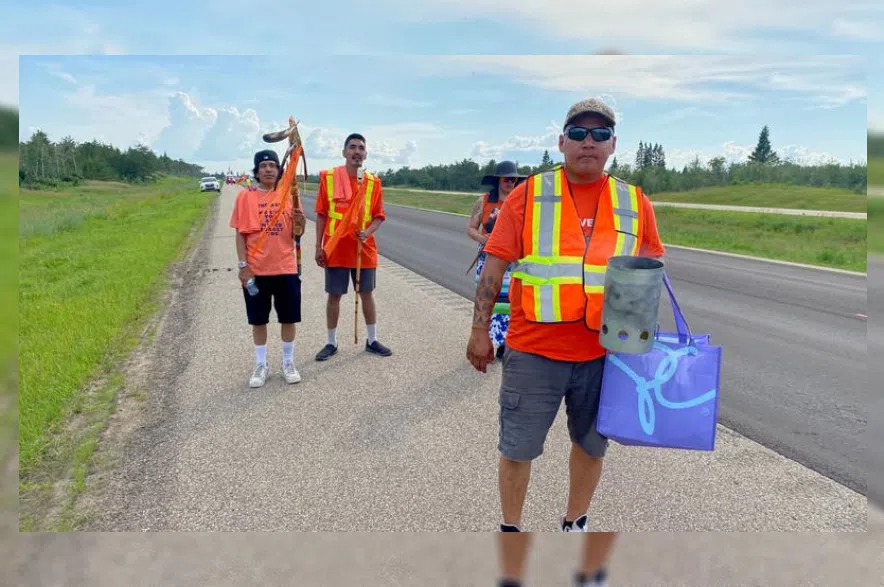There are only about 75 kilometres between Duck Lake and Wahpeton Dakota First Nation, but it’s a much longer journey for Scott Bird on the path of reconciliation.
“My whole family was part of the [Indian residential] school system. So, that’s why I walk here today. I’m here today because they survived.”
Bird is taking part in what’s become an annual walk from the site of the former Indian residential school at Duck Lake to his home community just northwest of Prince Albert. He said the walk is an opportunity to raise awareness, but it’s also in memory of those who lost their lives there.
“This whole walk is to bring them home,” he said. “And not just bring them home…this walk is to help us heal and help forgive.”
Bird was joined by a few other walkers making the trek up Highway 11 Saturday afternoon. Some carried bright orange ‘Every Child Matters’ flags. Others, like Natalie Clyke from White Bear First Nations in southeast Saskatchewan, wore ribbon skirts. Hers was adorned with pictures of family members.
“My mom and uncle are survivors of St. Michael’s (Duck Lake) Indian residential school. So, in our fourth year of walking our children home…its been an opportunity to really process a deeper healing as we honour survivors,” Clyke said.
Natalie Clyke of White Bear First Nation is one of the people travelling from the site of the former residential school near Duck Lake to Wahpeton Dakota Nation. The group is raising awareness, honouring survivors and remembering those who lost their lives.
About 150,000 Indigenous children were removed and separated from their families and communities to attend residential schools in Canada. The one near Duck Lake opened in 1894 and closed in 1996. Historical information from an eBook the University of Regina published called Shattering the Silence: The Hidden History of Indian Residential Schools in Saskatchewan, revealed details about the high death rate among students. In 1910, an Indian agent, which were the Canadian government’s representatives on First Nations reserves from 1830s to 1960s noted, “about one-half of the children sent to Duck Lake Boarding School, die before the age of 18, or very shortly afterwards.”
Linda Buffalo is a survivor. She’s the one who initially started the walk four years ago after unmarked graves were discovered in Kamloops, B.C. and Cowessess.
“The message has been the same for the last few years. It’s a healing process for the survivors who went to St. Michael’s school and also this is about healing for the families of the ones who never made it home,” Buffalo said. “It’s also for the children of survivors. They’re going through some things now because of the way their parents were treated in school.”
Buffalo said some survivors never healed from the abuse they received at school and that carried on into the upbringing of their children.
“And I find some of them are in the same situation acting out and making bad choices,” she said. “They don’t know what to do or where to go. Some are homeless and hitting drugs and alcohol and they can’t get past it. That’s why this is important for me as an individual to try and help these people through prayer as I walk in this journey.”
While Buffalo is pleased to see more awareness about the legacy of residential schools across the country, she said its difficult for many survivors, especially Elders, to participate in walks, workshops and other meetings that are held .
“It’s not enough. The individuals who need this healing ..sometimes you can’t get to places. Like for myself, I am strapped at home. I can’t go to workshops or join other walks. It just puts a damper on my feelings that I can’t go and help them do what they need to do.”
This is expected to be the final year for the walk. The group hopes to be in Wahpeton by late Sunday afternoon.











